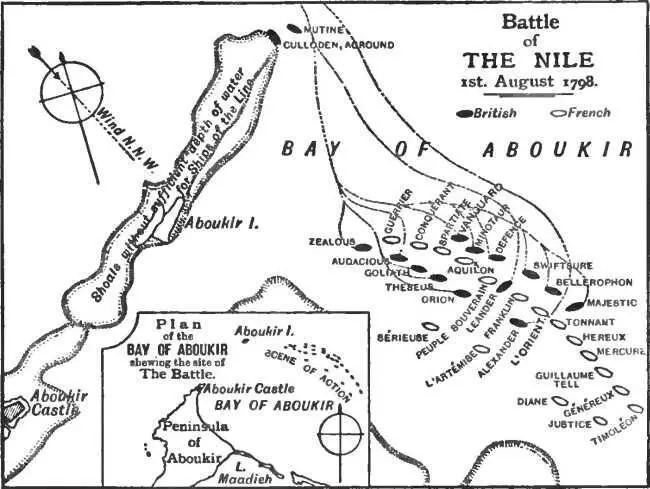George Henty - At Aboukir and Acre - A Story of Napoleon's Invasion of Egypt
Здесь есть возможность читать онлайн «George Henty - At Aboukir and Acre - A Story of Napoleon's Invasion of Egypt» — ознакомительный отрывок электронной книги совершенно бесплатно, а после прочтения отрывка купить полную версию. В некоторых случаях можно слушать аудио, скачать через торрент в формате fb2 и присутствует краткое содержание. Издательство: Иностранный паблик, Жанр: foreign_children, foreign_antique, foreign_prose, на английском языке. Описание произведения, (предисловие) а так же отзывы посетителей доступны на портале библиотеки ЛибКат.
- Название:At Aboukir and Acre: A Story of Napoleon's Invasion of Egypt
- Автор:
- Издательство:Иностранный паблик
- Жанр:
- Год:неизвестен
- ISBN:нет данных
- Рейтинг книги:5 / 5. Голосов: 1
-
Избранное:Добавить в избранное
- Отзывы:
-
Ваша оценка:
- 100
- 1
- 2
- 3
- 4
- 5
At Aboukir and Acre: A Story of Napoleon's Invasion of Egypt: краткое содержание, описание и аннотация
Предлагаем к чтению аннотацию, описание, краткое содержание или предисловие (зависит от того, что написал сам автор книги «At Aboukir and Acre: A Story of Napoleon's Invasion of Egypt»). Если вы не нашли необходимую информацию о книге — напишите в комментариях, мы постараемся отыскать её.
At Aboukir and Acre: A Story of Napoleon's Invasion of Egypt — читать онлайн ознакомительный отрывок
Ниже представлен текст книги, разбитый по страницам. Система сохранения места последней прочитанной страницы, позволяет с удобством читать онлайн бесплатно книгу «At Aboukir and Acre: A Story of Napoleon's Invasion of Egypt», без необходимости каждый раз заново искать на чём Вы остановились. Поставьте закладку, и сможете в любой момент перейти на страницу, на которой закончили чтение.
Интервал:
Закладка:
After the despatch of the messenger the two friends rode along the shore until they could not only make out the exact position of the French fleet, but count the guns in the broadsides of each vessel. It consisted of thirteen line-of-battle ships, comprising the flag-ship the Orient , of 120 guns, three of 80, and nine of 74, together with four frigates, four mortar vessels, and a number of gun-boats, while on an island ahead of the line was a battery of guns and mortars. Many parties of Arabs were riding about on the shore, and there were several of their encampments. Some had been attracted to the spot from a considerable distance in order to view the great vessels of which reports had reached them, others again were simply there from the spirit of restlessness that pervaded the population.
The news of the battle of the Pyramids had not yet arrived, and all were in suspense. The belief that the Mamelukes would defeat the French was all but universal. Had this taken place the whole of the Arab tribes would at once have harassed the retreat of the defeated army, and with the Mamelukes pressing upon them it is probable that not a single Frenchman would have reached the sea. As Edgar and his friend were watching the French fleet a vessel was seen over the spit of sand. She was some three miles out at sea.
"There is another of their ships of war, Sidi. I wonder whether she has been scouting along the coast to gather news as to where our fleet may be at present?"
When she came abreast of the extremity of the bay she changed her course and bore closer in.
"She is coming in to join the others. I wonder what news she brings?"
When, however, she approached within two miles of the French fleet she again changed her course, and bore along parallel with the coast.
"I suppose she is going into Alexandria. She hasn't got any colours flying. That is curious, too; all the ships here are flying theirs. Look! there are men at the mast-heads of several of the ships examining her with telescopes. That is curious, too, for she is not signalling. There she is, turning again and making out to sea. Perhaps she is a British ship sent on ahead by Nelson to discover the position of the French. If it is so we shall most likely have the fleet here to-morrow. Then we shall see a big battle; at least we shall if the French don't run away. See! there is a twelve-oared boat starting from the admiral's ship and rowing right away. They must be going to Alexandria. They are rowing hard, too."
They watched it for some time, and then returned to their tent. Two hours later a number of ships' boats were seen coming out from Alexandria.
"They are men-of-war boats," Edgar said. "I think I must have been right, and that that vessel we saw must have been an English frigate. That boat has been sent to order all the sailors we saw in the streets of the town to return at once."
For some hours boats continued to pass, all filled with men, but there were no signs of movement on the part of the ships.
"If it was one of our frigates the French admiral must have made up his mind to fight them. They have got a great advantage, covered as they are by those two land batteries. Besides, I know that there is a spit of sand running out there which will make it very awkward for an enemy, not knowing its position, to attack them. There is one thing, the French will find it difficult to sail out if they want to. You see the wind is on shore, and they are all riding head to it. There can't be much water inside them. No doubt they could get out all right if they had plenty of time and no one to interfere with them, but it would be a difficult business to manage if the British fleet were upon them."
At ten o'clock the next morning a number of large vessels were seen in the distance. They bore down towards Alexandria, but the wind was light and they made but slow way, and it was five in the afternoon before, having changed their course, they formed into line of battle and headed for the French fleet. The scene from the shore was intensely exciting. In each fleet there were thirteen battle-ships, but the French ships were the larger and more heavily armed. They carried forty-six more guns, and the weight of their broadside was 14,029 pounds to 10,695 pounds, while they carried 2300 more men, and were 5000 tons heavier. They had, too, in addition, four frigates, besides the mortar vessels, gun-boats, and the battery on the island of Aboukir. Soon after six o'clock, the two leading vessels of the British fleet being within range, the French opened fire, as did the guns of the battery. Edgar uttered an exclamation of disgust as one of the largest of the English ships was seen to stop suddenly in her course.
"She has run on the shoal!" he exclaimed. "Look, our ships are steering for the head of the French line; they mean to go inside them."
As the British vessels reached the head of the French ships they anchored one after another, each laying itself broadside to broadside against an opponent, and the battle commenced with terrible energy, the tremendous roar of the guns astounding the Arabs who were gathered on the sand-hills. At first the French reply was feeble. They were taken entirely by surprise by Nelson's manœuvre. Believing that he could only attack them from outside, they had prepared only on that hand for the fight, and in clearing the decks for action all the useless gear and fittings had been piled over on the other side, and it was some little time before this could be cleared away and the guns got ready for action. Then for a time their fire was as heavy as that of the British. Nevertheless some of them had suffered terribly before they were able to return a shot, and this contributed in no small degree to the British victory.
The loss of the Culloden , which was the vessel which struck on the sands, and of the Leander , which went to her assistance, was serious, and had the French rear-admiral, Villeneuve, who commanded the five vessels at the rear of the French line, cut his cables and come to the assistance of his comrades, the eight British ships, engaged with as many French, would have been in a serious position. He did not do so, however, possibly fearing to run his ships aground. Consequently the Alexandria and the Swiftsure came in to the assistance of the British ships, some of which were being terribly damaged by the greatly superior weight of the French fire. The Bellerophon , dismasted and disabled by the enemy's fire, dropped out of the line, and the Alexandria took her place, while the Swiftsure attacked the Franklin . The Leander , seeing how hard was the fight, relinquished her attempt to get the Culloden afloat, and, sailing in, engaged in the battle.

Battle of THE NILE
1st. August 1798.
For a time the issue was doubtful. The three English seventy-four-gun ships were matched against one of a hundred and twenty and two of eighty-four. Darkness did not put a stop to the engagement, which continued to rage with unabated fury, the battle being practically between twelve British ships and eight French ships of the line and their four frigates and gun-boats. By ten o'clock five of the French van had surrendered, and the great hundred-and-twenty-gun ship, the Orient , was in flames. The excitement of the Arabs as the battle continued was unbounded. It seemed to them that mortal men could not sustain so terrible a conflict, and exclamations of wonder and admiration rose constantly among them.
The light of the burning vessel enabled the whole of the terrible scene to be clearly witnessed. Half the ships were partly or wholly dismasted, the rigging was cut to pieces, and the sails were riddled with balls. The splintered sides, bulwarks shot away, and port-holes blown into one, showed how terrible was the damage inflicted on both sides. Higher and higher rose the flames on board the Orient . Men could be seen leaping overboard into the water from the burning ship, and soon after ten she blew up with a tremendous explosion, the concussion of which was so great that many of the Arabs were thrown to the ground. For ten minutes a dead silence succeeded the roar of battle, not a gun was fired on either side. The British vessels near the spot where the Orient had lately floated lowered what boats there were uninjured and set to work to rescue the survivors, who were either clinging to spars or were swimming. Several of these, too, were hauled in at the lower port-holes of the ships.
Читать дальшеИнтервал:
Закладка:
Похожие книги на «At Aboukir and Acre: A Story of Napoleon's Invasion of Egypt»
Представляем Вашему вниманию похожие книги на «At Aboukir and Acre: A Story of Napoleon's Invasion of Egypt» списком для выбора. Мы отобрали схожую по названию и смыслу литературу в надежде предоставить читателям больше вариантов отыскать новые, интересные, ещё непрочитанные произведения.
Обсуждение, отзывы о книге «At Aboukir and Acre: A Story of Napoleon's Invasion of Egypt» и просто собственные мнения читателей. Оставьте ваши комментарии, напишите, что Вы думаете о произведении, его смысле или главных героях. Укажите что конкретно понравилось, а что нет, и почему Вы так считаете.












